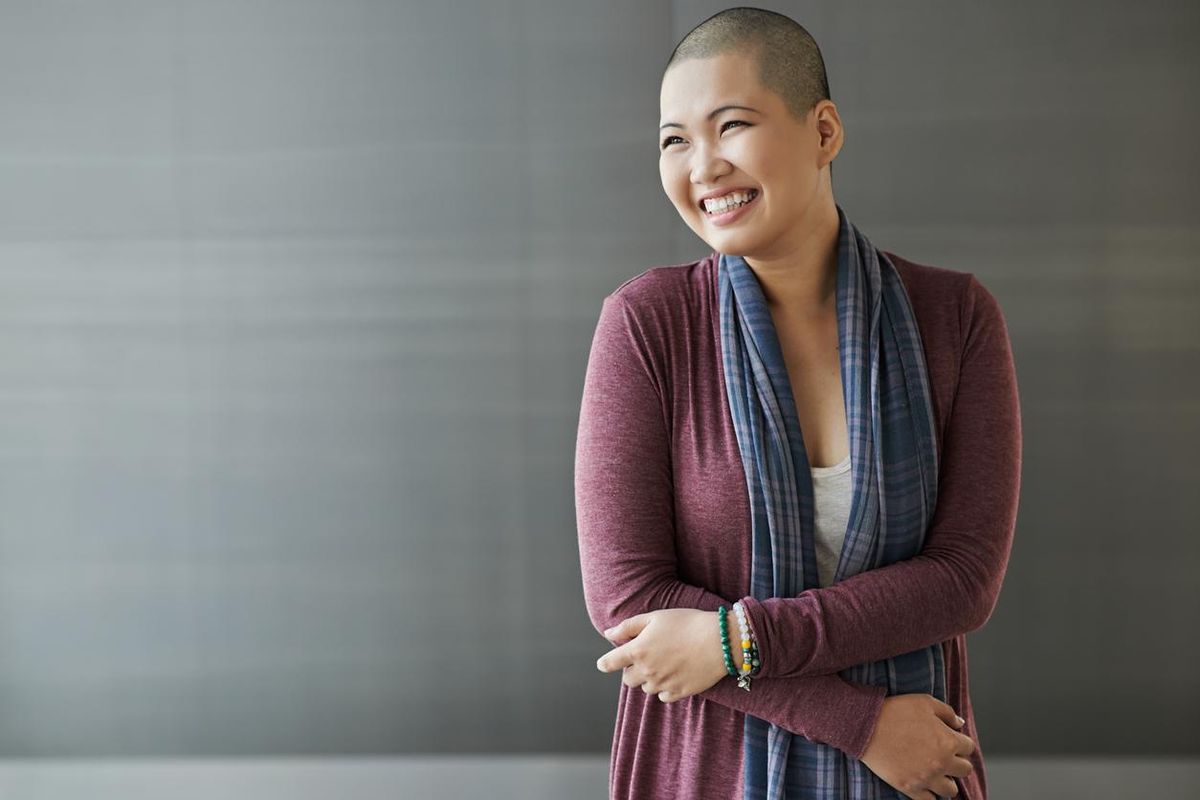In 2008, Barbara Daley was diagnosed with stage 1 breast cancer after finding a lump in her breast. It was caught early and her treatment primarily involved chemotherapy. Still, the chemo was tough on her, often leaving her feeling sick. But it worked: Daley was soon in remission.
Fast forward to 2020 and she started noticing changes in her body: She felt a lump under her arm, was having pain in her chest and had trouble breathing if she had to run to catch the bus.
Daley, 61, soon found out that her cancer had returned, and this time had spread to her bones, lungs and chest wall. She was diagnosed with stage 4, or metastatic breast cancer — a term that’s applied once the disease has moved beyond the breast and nearby lymph nodes.
Currently, Daley, who sees Jailan Elayoubi, M.D., an oncologist and breast cancer researcher at the Karmanos Cancer Institute in Detroit, is on two medications: palbociclib, part of a game-changing class of medications that disrupt the growth of cancer cells, known as CDK4/6 inhibitors. The second is letrozole, which helps reduce female hormone levels.
And this treatment is helping her maintain her quality of life. Her side effects are minimal — she feels tired and nauseous sometimes — and she’s able to continue working full-time in housekeeping.
What is metastatic breast cancer?
Before we delve further into the treatment, let’s explain a bit more about the disease itself. “Metastatic breast cancer is cancer that has spread outside of the breast and chest wall area, which means some of the cells have slipped into the bloodstream,” Elayoubi said. “They circulate and then they seat themselves into an organ outside of the breast.” This could be in the bone, liver or brain — really, anywhere outside of that original region.
More than 168,000 women in the United States have metastatic breast cancer, with the majority having been first diagnosed — like Daley — with breast cancer at an earlier stage, according to the breast cancer nonprofit Susan G. Komen. In fact, only about 6% percent of people are diagnosed with stage 4 from the get-go, according to Komen.
Although there is no cure for stage 4 breast cancer and survival rates vary by subtype, the overall five-year survival rates have gotten better over time. For example, a 2022 report from the American Cancer Society (ACS) found that the five-year survival rate for all subtypes is 29%. In comparison, 10 years ago, in 2012, that number was 23%.
Racial disparities persist at almost every stage of breast cancer. In that 2022 report, the ACS found that Black women have lower survival rates for every stage of diagnosis other than stage 1, compared to white women. The largest Black to white disparities were among those diagnosed with stage 3 and stage 4 breast cancer. The five-year survival rate for white women with stage 4 breast cancer is 31% — and it’s just 20% for Black women.
Overall, when it comes to metastatic breast cancer, the goal is to manage and maintain the disease for as long as possible, while helping women retain a good quality of life — and new treatment options are helping to make that an option for many women.
Treating metastatic breast cancer
There are various subtypes of breast cancer — and treatment depends on which type you have. (Since every case is different, your doctor will have the best understanding of what treatment is best for you.)
What are the three main breast cancer subtypes?
Hormone receptor-positive breast cancer: This type of breast cancer may be fueled by abnormal estrogen or progesterone signals in the cells. So, treatment typically involves blocking those hormones. “Before, we used to start with pretty harsh cytotoxic chemotherapies,” said Azadeh Nasrazadani, M.D., Ph.D., assistant professor at the Department of Breast Medical Oncology, Division of Cancer Medicine, at the University of Texas MD Anderson Cancer Center in Houston. “Now we are able to, in this particular class of breast cancer patients, start with an oral option that is less harsh and does not affect their quality of life as badly.”
This class of oral medications are CDK4/6 inhibitors and includes three types of oral medications: palbociclib, ribociclib and abemaciclib. While side effects do occur, they’re minimal, and the pills may be taken in combination with others — like how Daley takes palbociclib and letrozole. And research shows its impact: A 2021 study found that women taking a combo of ribociclib and letrozole lived about a year longer than those who were on just the hormone blocker.
HER2-positive breast cancer: People with this type of breast cancer have increased levels of a protein known as HER2, which can make cancer cells grow faster. Treatment typically targets the HER2 protein. Elayoubi said that 20 years ago, there was just one HER2-targeted therapy available (trastuzumab). “Now we have more than eight newer generation HER2-targeted treatments that we can use for patients with metastatic breast cancer,” she said. One to know: Enhertu (that’s the brand name for something called trastuzumab deruxtecan), which is delivered via IV. Earlier this year, the FDA approved its use earlier in a stage 4 treatment regimen, as well as for patients with lower levels of HER2.
Triple-negative breast cancer: This very aggressive type of breast cancer has no specific receptors or proteins to target, which makes it more difficult to treat. Treatment typically involves chemotherapy, and for some patients, immunotherapy in addition to chemo has been helpful. Immunotherapy ramps up your immune system so it can find and kill cells with cancer more efficiently. In 2021, the FDA approved use of the treatment sacituzumab govitecan — known by its brand name Trodelvy — which is given via IV. The medication has been shown to help patients live longer, said Elayoubi. In the study cited in the drug’s FDA approval, the median overall survival rate for patients taking sacituzumab govitecan was about five months longer than for patients undergoing chemo.
Metastatic breast cancer treatments continue to evolve
Also helping to change the treatment game for patients with metastatic breast cancer: next-generation sequencing, also known as molecular testing. With this method, either a tumor biopsy or blood sample is taken and then tested for a series of markers or mutations to create a treatment that specifically targets any markers that are found.
“If we don’t look for these markers, we’re going to miss the few but lucky patients who have that marker [and] can benefit from an additional line of treatment,” said Elayoubi. And sometimes, she said, that additional treatment is tailored to that specific patient’s cancer, which can help them do well for even longer.
Next-generation sequencing — along with many FDA-approved medications — is often covered by insurance, but contact your doctor and your insurance company before starting any new medications or treatments.
“The therapies that have been developed over recent years are the culmination of major strides we have made [in] understanding the underlying biology driving the different types of breast cancer,” said Nasrazadani. “This has allowed for development of more targeted therapies that are more effective and less toxic, which translates to improvements in survival rates and better quality of life.”
Advancements are likely to continue to be made, but these new medications, regimens and testing options have already made a big impact, turning a once-terminal disease into a chronic condition for many.
- Where Metastatic Breast Cancer Can Spread in the Body ›
- Understanding Advanced Breast Cancer Treatment ›
- Metastatic Breast Cancer Treatment Was Destroying My Spirit — Until I Tapped Into My Colombian Roots and Alternative Medicine ›
- Metastatic Breast Cancer ›
- New Hope for Incurable Breast Cancers - HealthyWomen ›
- What is metastatic cancer? - HealthyWomen ›






